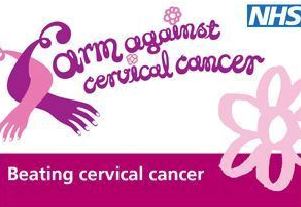
Cervical Cancer
Cervical cancer occurs in the cervix (the entrance to the womb). It is caused by a virus called human papillomavirus, or HPV. Cervical cancer can be very serious and around 1,000 women die of it in the UK each year.
HPV
The HPV virus is very common and you catch it by being sexually active with another person who already has the virus. Because it is so common most people will get infected at some point in their lifetime.
There are different types of HPV. Most of the time people with the virus do not know that they have been infected with HPV because it does not cause any problems or symptoms. The most common way that someone with HPV might present is with warts or verruca. The type of HPV that causes genital warts or verrucas is not the same type that causes cervical cancer.
Most of the time, even if someone has the type of HPV which could cause cancer they do not go on to develop cervical cancer because the virus is killed off by the body’s immune system. But the vaccine is important because it reduces your chances of getting cervical cancer even further by 70%.
The HPV Vaccine
The vaccine protects against four types of the HPV virus that cause most (over 70%) of the cases of cervical cancer. You will need three injections over several months to get the best protection.
The vaccine will also protect you against genital warts but it won’t protect you from other STIs like Chlamydia and it won’t stop you from getting pregnant.
Who can have the vaccine?
All girls aged 12 to 13 are offered HPV (human papilloma virus) vaccination as part of the NHS childhood vaccination programme. It’s usually given to girls in year eight at schools in England.
Will I still need to get a cervical screening test (a ‘smear test’) if I’ve had the HPV vaccine?
Yes, when you reach 25 years you will receive a letter from your GP explaining the test in more detail and inviting you to make an appointment. If you had the HPV vaccine at 13 years old then you are at lower risk (up to 70% less) but the vaccine does not protect against all types of HPV so there is still a chance that women will develop cervical cancer. Although a ‘catch-up’ vaccination is being offered to teenagers over the age of 13 years, the vaccine is less effective once HPV exposure has already occurred. Screening will pick up any changes early on when they can be easily treated. See the NHS website for more information here
Can I have a smear test if I am less than 25 years?
In 2004, the age for women to be invited for cervical screening was set at 25 years. This was because doctors and experts realised that changes seen in younger women were often normal and that some women were being treated and worried unnecessarily. It is very rare to develop cancer below the age of 25 and the harm and worry of having the tests is no longer considered to be greater than the benefits in women of this age. You should always be aware of any symptoms such as: bleeding between periods or after sex, pain during sex or an unpleasant discharge. If you experience any of these you should discuss them with a doctor or nurse immediately.

